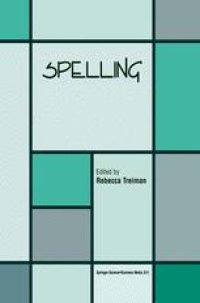
Ebook: Spelling
- Tags: Applied Linguistics, Psychology general, Language Education, Personality and Social Psychology, Education (general), Speech Pathology
- Year: 1997
- Publisher: Springer Netherlands
- Edition: 1
- Language: English
- pdf
are the findings that Wade-Woolley and Siegel obtained when they studied children for whom English was a second language. Although the second language speakers performed more poorly than the native speakers on tests of syntactic knowledge, phoneme deletion, and pseudoword repetition, the second language speakers were not worse than the native speakers in spelling. These results suggest that, even if children have not fully mastered the sound system of their second language, they need not be disadvantaged in spelling it. The findings appear to pose a challenge to views of reading and spelling that place primary emphasis on phonology. The Muter and Snowling study, together with the Nunes, Bryant and Bindman study, broadens the focus by examining aspects of spelling beyond phonology. Muter and Snow ling, in their longitudinal study of British school children, examined the degree to which various linguistic skills measured between the ages of 4 and 6 predicted spelling ability at age 9. The results support the idea that phonological skill plays an important role in spelling development, and further suggest that awareness of phonemes is more strongly related to spelling ability than awareness of rimes. In addition, grammatical awareness appears to predict spelling skill. Children who are able to reflect on meaning relationships among words may be in a position to understand how this information is represented in English spelling.